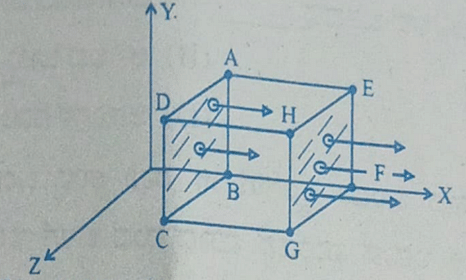Question:
The simplified form of $i^{n} + i^{n +1} + i^{n +2} + i^{n +3}$ is
The simplified form of $i^{n} + i^{n +1} + i^{n +2} + i^{n +3}$ is
Updated On: Apr 17, 2024
- 0
- 1
- -1
- i
Hide Solution
Verified By Collegedunia
The Correct Option is A
Solution and Explanation
We have, $ i^{n} +i^{n+1}+i^{n+2}+i^{n+3} $
$=i^{n}\left(1+i+i^{2}+i^{3}\right) $
$=i^{n}(1+i-1-i)$
$\left[\because i^{2}=-1 \text { and } i^{3}=-i\right] $
$=i^{n} \times 0=0$
$=i^{n}\left(1+i+i^{2}+i^{3}\right) $
$=i^{n}(1+i-1-i)$
$\left[\because i^{2}=-1 \text { and } i^{3}=-i\right] $
$=i^{n} \times 0=0$
Was this answer helpful?
0
0
Top Questions on Complex Numbers and Quadratic Equations
- The minimum value of \(| z+ \frac{3+4i}{2}|, |z| \leq 1\) is,
- JEE Main - 2024
- Mathematics
- Complex Numbers and Quadratic Equations
- For $z \in C$ if the minimum value of $(| z -3 \sqrt{2}|+| z - p \sqrt{2} i |)$ is $5 \sqrt{2}$, then a value of $p$ is ______
- JEE Main - 2023
- Mathematics
- Complex Numbers and Quadratic Equations
- If \(x^2-\sqrt2 x+2=0\) has roots 𝜶 and 𝛽 then 𝜶\(^{14}\) + 𝛽\(^{14}\) is:
- JEE Main - 2023
- Mathematics
- Complex Numbers and Quadratic Equations
- Let $p , q \in R$ and $(1-\sqrt{3})^{200}=2^{199}(p+i q), t=\sqrt{-1}$ Then $p + q + q ^2$ and $p - q + q ^2$ are roots of the equation
- JEE Main - 2023
- Mathematics
- Complex Numbers and Quadratic Equations
- If the ellipse $\frac{x^2}{a^2}+\frac{y^2}{b^2}=1$ meets the line $\frac{x}{7}+\frac{y}{2 \sqrt{6}}=1$ on the $x$-axis and the line $\frac{x}{7}-\frac{y}{2 \sqrt{6}}=1$ on the $y$-axis, then the eccentricity of the ellipse is
- JEE Main - 2023
- Mathematics
- Complex Numbers and Quadratic Equations
View More Questions
Questions Asked in KCET exam
- The current in a coil changes from 2A to 5A in 0.3s. The magnitude of emf induced in the coil is 1.0V. The value of self-inductance of the coil is
- KCET - 2023
- Electromagnetic induction
- A stretched wire of a material whose Young's modulus Y = 2 × 1011 Nm-2 has Poisson's ratio of 0.25. Its lateral strain εl = 10-3. The elastic energy density of the wire is
- KCET - 2023
- mechanical properties of solids
- A particle moves along the curve \(\frac{x^2}{16}+\frac{y^2}{4}=1\). When the rate of change of abscissa is 4 times that of its ordinate, then the quadrant in which the particle lies is
- KCET - 2023
- Conic sections
- A point object is moving at a constant speed of 1 ms-1 along the principal axis of a convex lens of focal length 10cm. The speed of the image is also 1 ms-1 , when the object is at _______ cm from the optic centre of the lens.
- KCET - 2023
- spherical lenses
- A cubical Gaussian surface has side of length a = 10 cm. Electric field lines are parallel to x-axis as shown. The magnitudes of electric fields through surfaces ABCD and EFGH are 6kNC-1 and 9kNC-1 respectively. Then the total charge enclosed by the cube is
[Take ε0 = 9 × 10-12 Fm-1]
- KCET - 2023
- Gauss Law
View More Questions
Concepts Used:
Complex Numbers and Quadratic Equations
Complex Number: Any number that is formed as a+ib is called a complex number. For example: 9+3i,7+8i are complex numbers. Here i = -1. With this we can say that i² = 1. So, for every equation which does not have a real solution we can use i = -1.
Quadratic equation: A polynomial that has two roots or is of the degree 2 is called a quadratic equation. The general form of a quadratic equation is y=ax²+bx+c. Here a≠0, b and c are the real numbers.




